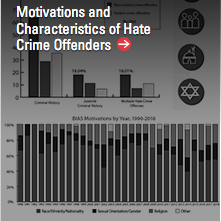 New research from the University of Maryland’s National Consortium for the Study of Terrorism and Responses to Terrorism (START) found tremendous diversity in hate crime offenders’ backgrounds and motivations.
New research from the University of Maryland’s National Consortium for the Study of Terrorism and Responses to Terrorism (START) found tremendous diversity in hate crime offenders’ backgrounds and motivations.
Researchers determined that these criminals are a diverse group. Offenders have varied motivations, background, demographic characteristics, criminal histories, and target selections. While most were motivated by race, ethnicity, and nationality (71 percent), some are increasingly motivated by sexual orientation or gender identity. The report was based on a database on nearly 1,000 violent and nonviolent hate crime offenders in the U.S.
One major trend: hate crimes targeting victims viewed as Latinx, Muslim and Arab have grown massively in the last two decades, from less than 5 percent of crimes in the 1990s to nearly a quarter of all attacks combined. Attacks on African Americans have also reached more than 40 percent of violent and nonviolent hate crimes.
Another trend found by the researchers is that hate crime offenders tend to have previous criminal backgrounds and sport higher rates of low education, poor work performance, mental illness, and substance abuse than other segments of society.
“We are seeing that there is a lot of diversity in terms of who is committing hate crimes and what their motivations are,” said Michael Jensen, START senior researcher. “There is a wide range of prejudices, background characteristics, educations, and work histories. Some offenders carefully plan their crimes to maximize their impact, others act without premeditation in response to prejudices that are pervasive in American communities.”











